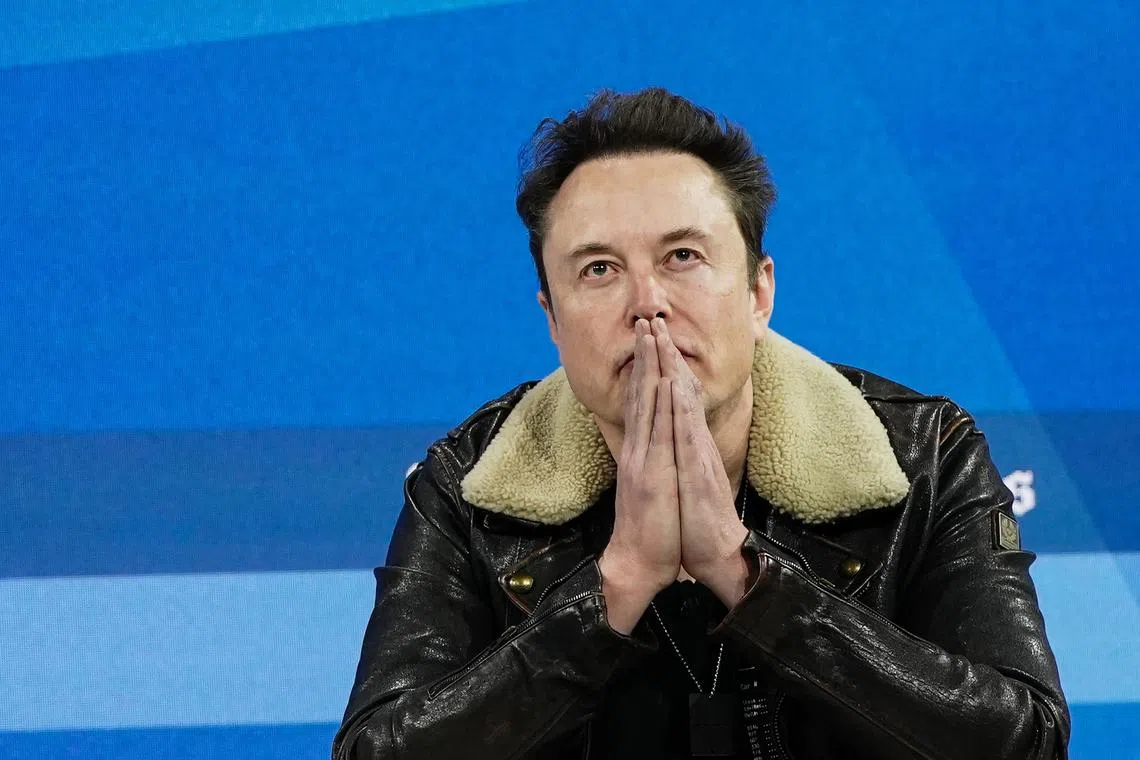Tesla shareholders advised to reject Elon Musk’s US$56 billion pay
Sign up now: Get ST's newsletters delivered to your inbox

Next month’s vote will be the second time Elon Musk’s pay package has been put before shareholders.
PHOTO: NYTIMES
NEW YORK - Tesla shareholders are being urged by a major proxy advisory firm to reject a proposed US$56 billion (S$75.6 billion) pay package for chief executive officer Elon Musk, in a blow to the electric-vehicle maker’s board.
Glass Lewis & Co. made its recommendation in a report released on May 25, citing the “excessive size” of the pay deal and the dilutive effect upon exercise.
“Mr Musk’s slate of extraordinarily time-consuming projects unrelated to the company was well-documented before the 2018 grant, and only expanded with his high-profile purchase of the company now known as X,” said Glass Lewis in the report.
The pay package was proposed by Tesla’s board of directors, which has repeatedly come under fire for its close ties with the billionaire. The package has no salary or cash bonus and sets rewards based on Tesla’s market value rising to as much as US$650 billion over the 10 years from 2018. The company is currently valued at about US$571.6 billion, according to LSEG data.
The recommendation to large institutional investors may sway their vote over Musk’s pay at the carmaker’s June 13 annual meeting. If the proposal is rejected, the CEO may make good on threats to develop products outside of Tesla.
Next month’s vote will be the second time Musk’s pay package
Musk then sought to move Tesla’s state of incorporation to Texas from Delaware. Glass Lewis also criticised the proposed move to Texas as offering “uncertain benefits and additional risk” to shareholders.
If Tesla’s board can show the compensation deal still has broad support, it may help with a legal appeal of the ruling. On the other hand, a loss would be a major embarrassment and demonstrate investors are losing faith in Musk’s leadership. The vote is only advisory, meaning Tesla can choose to ignore it.
About three-quarters of investors supported Musk’s pay deal six years ago. Glass Lewis had also recommended they reject the deal at that time, arguing it was too costly and would dilute other shareholders.
Tesla has been seeking to counter public criticism of Musk’s compensation with a campaign to win shareholder support. Board chair Robyn Denholm is reaching out to large institutional investors, while a “Vote Tesla” website is appealing to the company’s army of retail shareholders.
In an interview this month, Ms Denholm told the Financial Times that Musk deserves the pay package because the company hit ambitious targets for revenue and its stock price.
Musk became Tesla’s CEO in 2008. In recent years, he has helped improve results, taking the company to a US$15 billion profit from a US$2.2 billion loss in 2018 and seven times more vehicles have been produced, according to the online campaign website, Vote Tesla.
Glass Lewis has also recommended that shareholders vote against the re-election of board member Kimbal Musk, the billionaire’ s brother, while former 21st Century Fox CEO James Murdoch’s re-election was recommended. BLOOMBERG, REUTERS


